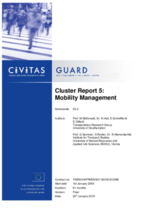Sustainable mobility marketing strategy
Summary
With the ultimate goal of creating a new mobility culture in Krakow, the city developed a marketing strategy to raise awareness of the negative environmental impacts of traffic and the advantages of sustainable modes.
Implementing sustainable mobility
As in many other cities in Central and Eastern Europe, the modal split in Krakow continues to be dominated by public transport, in spite of the clear trend towards increased private car ownership. In order to counter this trend and preserve the modal share of public transportation, measures such as fleet modernisation and the introduction of improved services, including integrated tickets and demand-responsive transportation in sparsely populated districts, are essential in retaining and attracting passengers. However, such measures can only be effective if they are successfully communicated.
Progress
The municipality of Krakow organised a series of seminars for specific target groups on issues related to sustainable mobility. These events provided an opportunity for the city to inform the public about demand management and sustainable transportation.
The city also introduced an incentive system, linking the purchase of public transport tickets with benefits such as participation in a lottery or “ecopoint” collection scheme, or with gifts such as t-shirts or gadgets. The “Gadgets for Tickets” scheme was the first loyalty programme for public transport in Poland. Validated public transport tickets could be exchanged for prizes (watches, torches, sports bags, backpacks and t-shirts), according to a set “price list”. The scheme was widely promoted via posters at bus stops, leaflets at ticket sales points, information screens on the city buses, and articles in the press.
A competition for children was organised, in which the first 100 people sending an email to a given address could receive a t-shirt, in exchange for a set number of validated travel tickets.
New ticket types were also introduced, such as tickets for specific target groups or particular events, and existing discounts, such as weekend family tickets, were promoted.
Mobility education was developed for schools and companies in order to raise awareness of sustainable transportation options. Fifteen seminars were organised in elementary and secondary schools and universities to encourage young people to discuss transport-related issues.
Car-Free Day, during European Mobility Week, is organised annually by the municipality. Recent celebrations have included events for children, bicycle rallies, tram and bicycle exhibitions, and free public transportation.
Outcomes
The “Gadgets for Tickets” loyalty programme proved very successful, with individuals, schools and companies participating in collecting tickets. More than 1,000 people were give prizes during the three-month scheme.
According to questionnaires completed during and after the programme, campaigns of this kind attract a high level of support among citizens. The project achieved its objective of raising public awareness of the topic of public transportation. It proved that infrastructure and service improvement must go hand in hand with marketing and information dissemination.








